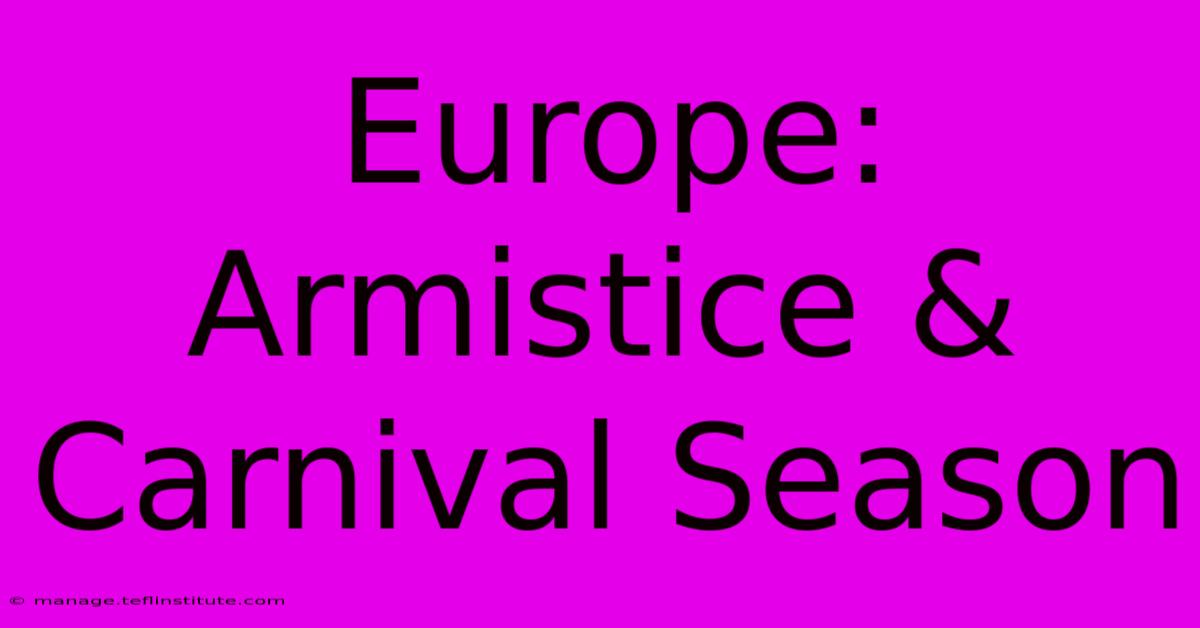Europe: Armistice & Carnival Season

Table of Contents
Europe: Armistice & Carnival Season - A Time of Remembrance and Revelry
Europe, with its rich tapestry of cultures and traditions, finds itself poised between two powerful forces this time of year: Armistice Day, commemorating the end of World War I, and the vibrant Carnival season, a joyous celebration of life and the impending spring. These contrasting yet intertwined events paint a poignant picture of human resilience and the enduring power of human spirit.
Armistice Day, observed on November 11th, serves as a solemn reminder of the sacrifices made during one of history's most devastating conflicts. Across Europe, monuments are adorned with wreaths and flags, and somber ceremonies are held to honor the fallen. From the iconic Arc de Triomphe in Paris to the poignant Last Post ceremony at the Menin Gate in Belgium, the day is marked by quiet reflection and a deep sense of gratitude for the peace we enjoy today.
While the weight of history hangs heavy, the air soon fills with the contagious energy of Carnival, a spectacle of vibrant costumes, lively music, and joyous revelry. Starting in January and culminating in the weeks leading up to Ash Wednesday, Carnival celebrations sweep across Europe, from the masked balls of Venice to the boisterous parades of Cologne. This period, known as Shrovetide in some regions, embraces indulgence and carefree joy before the solemn period of Lent.
The contrast between Armistice Day and Carnival is a testament to the complexities of human experience. It reminds us of the fragility of peace, the importance of remembrance, and the enduring human desire for joy and celebration. While we remember the sacrifices of the past, we also embrace the present and look forward to the future with hope and optimism.
Here's a glimpse into the diversity of traditions across Europe during this season:
- France: The French celebrate Armistice Day with a solemn ceremony at the Arc de Triomphe, accompanied by the playing of the "Marseillaise" and a moment of silence. Carnival traditions vary regionally, with the most notable being the Carnaval de Nice, known for its elaborate flower parades and battle of flowers.
- Germany: Germany observes Remembrance Day (Volkstrauertag) on the Sunday before Armistice Day, followed by a national day of mourning. Carnival (Fasching) is particularly celebrated in the Rhineland, where elaborate parades and parties fill the streets.
- Italy: In Italy, Armistice Day is marked with national celebrations, including parades and ceremonies. Carnival, known as Carnevale, is most famous in Venice, with its elaborate masks and costumed balls.
- Spain: Spain commemorates Armistice Day with solemn ceremonies and moments of reflection. Carnival, called Carnaval, is celebrated in many cities, but the most vibrant is the Carnaval de Tenerife, known for its spectacular costumes and street performances.
As Europe prepares for the transition from remembrance to revelry, the spirit of unity and shared history prevails. Both Armistice Day and Carnival remind us that, despite our differences, we are all connected by the threads of humanity and the pursuit of peace, joy, and hope. This unique blend of solemnity and celebration allows us to embrace the past, appreciate the present, and look forward to a brighter future.

Thank you for visiting our website wich cover about Europe: Armistice & Carnival Season. We hope the information provided has been useful to you. Feel free to contact us if you have any questions or need further assistance. See you next time and dont miss to bookmark.
Featured Posts
-
Luke Evans Shares Love For Partner Fran Tomas
Nov 12, 2024
-
Leadbeater Backs Assisted Dying Bill Protections
Nov 12, 2024
-
David Coote A Public Humiliation
Nov 12, 2024
-
Rep Stefanik Headed To Un Under Trump
Nov 12, 2024
Latest Posts
-
The Real Pedro Pascal Meet His Sister
Nov 15, 2024
-
Pedro Pascals Sister Life And Career
Nov 15, 2024
-
Pedro Pascals Sister A Closer Look
Nov 15, 2024
-
Pascal Sibling Duo Hits Gladiator Ii Premiere
Nov 15, 2024
-
Pedro Pascals Sister Who Is She
Nov 15, 2024
-
Pedro Pascals Sister Facts You Didnt Know
Nov 15, 2024
